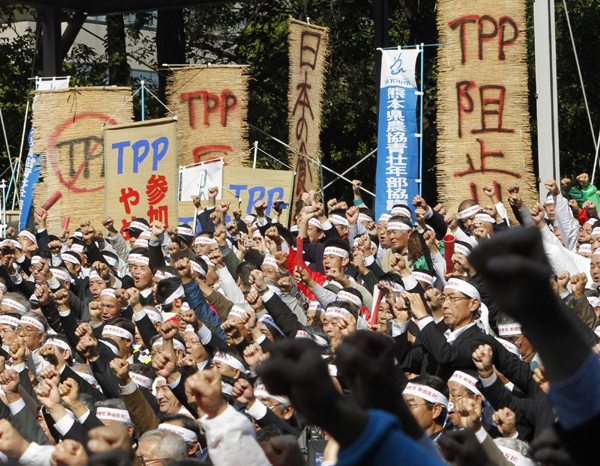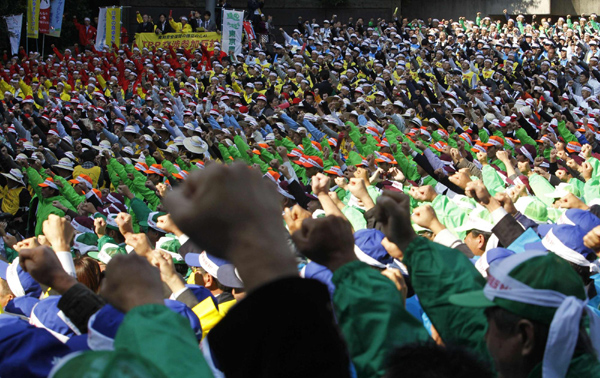Trans-Pacific Partnership for a cheaper bowl of beef and rice

Japan Times | Sunday, Nov. 28, 2010
BIG IN JAPAN
Trans-Pacific Partnership for a cheaper bowl of beef and rice
By GEOFF BOTTING
The APEC summit in Yokohama earlier this month was a key event by any standard. Leaders of 21 countries came to discuss how to integrate the world’s most dynamic region in terms of trade.
For many Japanese, however, one issue overshadowed all the rest, and it didn’t even take center stage. Rather, the Trans-Pacific Partnership (TPP) initiative was discussed by leaders of nine of the countries on the summit’s sidelines. The initiative could become the building block for a free-trade zone throughout the entire Asia-Pacific region.
It’s a huge issue for all the countries that decide to take part. But for Japan, the implications of TPP’s membership are almost impossible to exaggerate. The business magazine Diamond (Nov. 20) says the decisions made now by Japan’s policymakers on TPP will shape the very nature of this nation in the coming years.
"An open country or a closed country?" Diamond ponders."This judgment is not just about farming. From the view of capital, labor and all kinds of perspectives, will Japan continue to be active in global capitalism? Or will we continue to shut ourselves off, enhancing our peculiar nature?"
Japan is the world’s laggard when it comes to free-trade deals. But not for want of enthusiasm. With an ever-strengthening yen, market share of its major exports being eaten away by the Koreans, Chinese and others, and stagnating economic growth, Tokyo increasingly is pinning its hopes on free trade to help it emerge from its economic morass.
Prime Minister Naoto Kan clearly likes the idea. In October, he announced that Japan would study getting on board with the TPP, which would eliminate all tariffs in principle after a 10-year period.
The main stumbling block in all this has been Japan’s farmers. Coddled by the previous conservative administrations of the Liberal Democratic Party, Japanese farming exists behind a wall of steep tariffs. Should those duties be eliminated and the floodgates opened, argue many farmers and their supporters, Japan would be awash in cheap imports, destroying Japanese farming as we know it.
The argument is not limited to a vociferous few. Senior officials of the ministry of Agriculture, Forestry and Fisheries, no less, subscribe to this view, in open defiance of the prime minister.
Diamond says those who oppose TPP tend to be the old guard, "people with vested interests." "Liberalization will be a good opportunity to develop new export markets," an executive at Mitsubishi Corp. is quoted as telling the magazine, referring to farmers with decent scale and a bit of vision.
One such visionary appears in another magazine, Shukan Asahi (Dec. 3). Shigeaki Okamoto, a kind of agro- businessman, writes a commentary arguing the merits of TPP. Okamoto is busy these days scouting out foreign markets for his Japanese-grown vegetables, which he cultivates at his farm in Aichi Prefecture.

Best to look at the big picture when farmers judge the TPP, he says. "If Japan is late in joining the TPP, its export industry will lag, inevitably leading to salary cuts and more unemployment. Should that happen, consumers will buy a lot fewer agricultural products — and agriculture will go into a decline," he says.
Flash (Nov.30), a magazine perhaps better known for its glossy pictures of young female models in various states of undress than for sober discussions on trade policy, approaches the issue by examining a certain urban myth now making the rounds: The TPP would cut the price of a bowl of gyudon to ¥100.
The dish, which consists mainly of rice and sliced beef, is currently priced at ¥380 at Yoshinoya, one of the nation’s major gyudon-serving chains. Both ingredients are subject to stiff tariffs; under TPP, the duties would become zero.
In an article titled "TPP, what’s that?" Flash turns to Takuro Morinaga, an economist and media commentator, to determine the truth.
"Raw materials are only around 30 percent of the initial cost (of a gyudon serving)," he says, as he prepares to shatter the myth. "On top of that, there are costs from distribution to maintenance costs of the restaurants to labor costs. And these fixed costs are already at a bare minimum and can’t be shaved any further.
"Yoshinoya’s profit is said to be around ¥10 per bowl. So even if the tariffs go to zero, the ripple effect would be extraordinarily small.
"For Yoshinoya, that means a fall in price of ¥30 or maybe even ¥50 if they really push it."
Nevertheless, the idea of free trade is gaining support within the mainstream media. It was different a few years back, when farming was invariably portrayed as an expression of traditional Japanese culture and in need of protection.
But now, after a frustrating couple of decades of economic stagnation along with a rapidly integrating global economy, the media seem prompted by the fear that balking at free trade now could well leave Japan in the dust.





